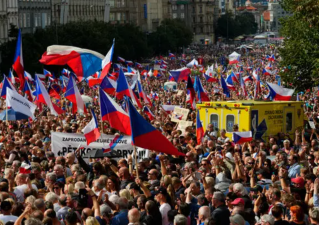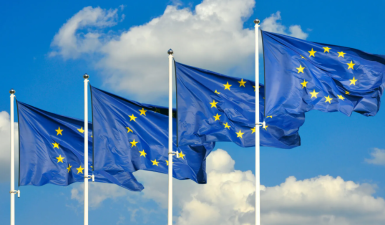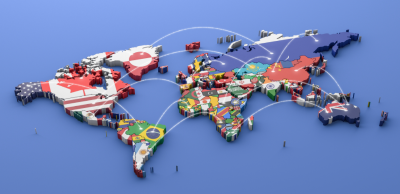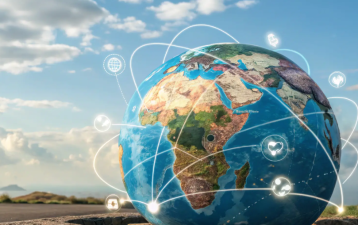The political turmoil in many European countries in 2025 is the result of a complex intertwining of contradictions, reflecting Europe's deep-seated difficulties in economic transformation, social divisions, the migration crisis, energy security, and its international strategic positioning. The current state of diversity in Europe paints a complex picture of contemporary European society, particularly highlighting the significant divide between the upper and lower classes in Britain and other European countries.This antagonism is not only manifested in contradictory attitudes towards the Muslim community, but also reflects the discrepancy between the narrative of solidarity championed by the upper class and the feelings of ordinary people against the backdrop of reduced welfare, insecurity, and cultural conflict. This tense situation extends from the Scandinavian Peninsula to the Mediterranean coast, and even affects Sweden, which is known as a "parallel society," where the prime minister once admitted that "parallel societies have emerged in Sweden."The following analysis is based on five dimensions:
Economic Recession and Social Divide:
The Underlying Logic of Public Discontent
The Eurozone's economic growth rate in 2025 is expected to be only 0.8%. Germany, once the "locomotive of the European economy," has contracted for two consecutive years. Leading companies such as Nord-Volkswagen have gone bankrupt, and Volkswagen has announced 35,000 layoffs. High energy prices, inflationary pressures (Germany's inflation rate will still reach 4.2% in 2024), and the surging costs of the green transition have led to a decline in the real incomes of the middle and lower classes. Farmers have repeatedly blocked traffic due to the impact of the European Green Deal and Ukrainian agricultural product imports. During the EU summit in February 2025 alone, over a thousand tractors blocked Brussels. This economic hardship has provided fertile ground for far-right parties. The Alternative for Germany (AfD) has risen to second place in the polls, and its call to "halt aid to Ukraine and prioritize domestic livelihoods" has attracted a large number of blue-collar voters.
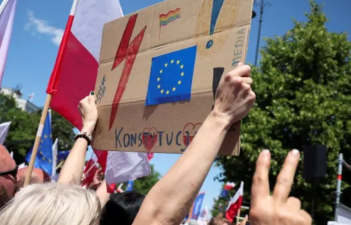
The Rise of the Far Right and Political Polarization:
A Crisis of Confidence in Mainstream Political Parties
In the European Parliament elections, the far-right group's share of seats increased from 13% in 2019 to 21%. France's National Rally received twice as many votes as Macron's camp, and Germany's Alternative for Germany surpassed the Social Democratic Party in the European Parliament elections. The far-right has successfully mobilized populists through anti-immigration, skepticism of EU integration, and opposition to radical climate change policies. For example, the Dutch Party of Liberals extended the naturalization threshold from five years to 10 years, while Germany's Alternative for Germany proposed a "border population check" policy. Mainstream political parties have been forced to shift rightward to compete for votes, resulting in a narrowing of policy space. To form a government, France's new Prime Minister Bayrou had to incorporate agricultural subsidies supported by the far right.
The Migrant Crisis and Security Dilemma:
A Vicious Cycle of Governance Failure
The number of illegal border crossings into Europe will exceed 150,000 by 2025, with the Mediterranean route accounting for nearly one-third, with Spain, Italy, and Greece as the main entry points. Although the EU introduced a "solidarity mechanism" through immigration law reform, countries like Hungary have refused to share refugees, resulting in weak policy implementation. Immigration issues are intertwined with security incidents. The knife attack in Solingen, Germany (which killed three and injured eight) and the synagogue arson attack in France have exacerbated social tensions. The far right has seized upon the situation to stigmatize immigrants as the "root cause of crime," with Germany's Alternative for Germany (AfD) even demanding the repatriation of refugees to the Syrian battlefield. This narrative has transformed immigration policy from a humanitarian issue into a tool of identity politics, further dividing society.
The EU's institutional rigidity and strategic loss:
integration progress is hindered
Serious divisions exist within the EU over issues such as aid to Ukraine, the fiscal framework, and agricultural policy. Hungary repeatedly vetoed EU aid to Ukraine, citing the need to "protect its agriculture," ultimately relenting after the EU threatened to cut funding. This, however, highlights the reality of prioritizing member states' interests. The Franco-German "twin engines" are underpowered: Macron was forced to form multiple governments due to parliamentary divisions, and the Scholz government resigned prematurely due to disagreements over economic policy. The EU's Green Deal and industrial policies also face challenges. Investment in the European Battery Alliance has reached only 40% of its target, and automakers have abandoned their electrification goals due to high costs. In terms of strategic autonomy, Europe is overly dependent on the United States. Trump's threats to impose tariffs on Europe after his election expose its passive position in the great power game.
International Conflict Spillover and Geopolitical Passiveness:
Multiple Crises Accumulate
The Russia-Ukraine conflict continues to drain European resources. While EU aid to Ukraine reached €50 billion in 2025, energy supply disruptions have led to a decline in industrial competitiveness, with the relocation rate of German chemical companies rising to 18%. Meanwhile, the deteriorating situation in the Middle East has exacerbated the refugee crisis. As EU resources shift toward Ukraine, they are reducing development aid to Africa, creating a vicious cycle of "more aid, more instability." In the security sector, German Chancellor Scholz held a rare phone call with Putin, and Slovak Prime Minister Fico visited Russia to discuss natural gas supplies, demonstrating the divergence of positions within Europe on the Russia-Ukraine conflict. This passive situation has weakened the EU's international voice, making it more difficult for it to establish an independent voice in the Sino-US game.

